- Home
- Michael Crichton
Zero Cool
Zero Cool Read online
Zero Cool
A Novel
Michael Crichton writing as John Lange
Contents
Part I
Prologue: The Seventh Floor
1. Tossa del Mar
2. The Pallbearers
3. Drinks and Sympathy
4. A Small Autopsy
5. Barcelona
6. Services Rendered
7. The Marriage of Cortez
Part II
Prologue
8. A Shot in the Arm
9. A Little Bit Tired
10. Paris
11. The Probability of Death
12. Getting Out
13. The Cell
Part III
Prologue
14. PNGed
15. The Count
16. Escape
17. Granada
18. Ismael
19. The Alhambra
20. The Odds Favored It
21. The Hole
22. Hunting
23. The Real Thing
24. The Faithful Servant
25. The Way Out
Epilogue
A Biography of Michael Crichton
Part I
“Radiologists see things in black and white.”
—D. D. McGowan, M.D.
Prologue
The Seventh Floor
THE SKULL HAD BEEN smashed in five places. Both cheekbones were broken across the zygomatic arch; there was a fracture of the left parietal bone; the mandible was shattered near the joint; and the nose was broken in two places.
Peter Ross, sitting in the dark room on the seventh floor where the X-rays were read, stared at the plate. With him was Jackson, the plastic surgeon.
“Hell of a mess,” Ross said. “You going to fix him tonight?”
“If we can. He’s still unconscious. But what do you expect? They had to cut him out of the car.”
“Good luck,” Ross said. He pulled the X-ray of the head off the lighted, frosted glass and handed it to Jackson. “You’ll be up all night.”
“I know,” Jackson said. “But we have to do it now. He hasn’t got much of a face at the moment, you know. He looks caved in.”
Ross shook his head. Maniacs, the way they drove. Taking so many chances. Sooner or later, they all got caught. “Was he drinking?”
“He certainly smelled like it.” Jackson collected the X-rays and slipped them into the folder. “Well, I’d better get down to the OR. They’re prepping him now. By the way, I understand you’re leaving.”
“Yes,” Ross said, flicking off the glass light.
“Passed your radiology boards?”
Ross nodded.
“Congratulations. Where are you going?”
“Right now,” Ross said, “I’m going to the annual meeting of the American Society of Radiologists.”
“Oh? Where?”
“Barcelona,” Ross grinned.
“You bastard. How long?”
“The conference lasts a week. But I’m staying a month.”
“Going to the Costa Brava?”
“Yes.”
“Before, or afterward?”
“Well, both, actually.” Ross grinned again. “I need a rest.”
“You won’t get one there,” Jackson said. “It’s full of English and Swedish girls, this time of year.”
“Is it?” Ross said innocently. “I hadn’t heard that.”
“I’ll bet you hadn’t.”
They walked out of the radiology laboratory, toward the elevators. It was late evening; there was no one around.
“I hear,” Jackson said conversationally, “that the girls are on the beach so thick you practically can’t find any sand.”
“Interesting.”
“I hear,” Jackson said, “that they are wildly eager to meet any young man, no matter how ugly.”
“Fascinating.”
“I hear,” Jackson sighed, “that they are all deeply passionate, fabulously attractive, and incredibly sexy.”
“Remarkable,” Ross said.
The elevator came, and they both got on. Jackson punched the button for three; Ross pressed the ground floor.
“Tell me,” Jackson said. “Are you going to do anything worthwhile while you’re in Spain, aside from mistreating sweet young things?”
“Well, yes, actually,” Ross said. “I’m delivering a paper at the conference.”
“You’re kidding.”
“I’m not.”
“A paper? On what?”
“Diagnosis of intestinal obstruction in infants.”
“Unbelievable. Where did you ever find time to write a paper? You’ve been with that nurse on the sixth floor—”
“Where there’s a will,” Ross said, “there’s a way.”
“Do tell.”
“My motto is: clean living, hard work, and lots of sleep. I also brush after every—”
“This is where I get out,” Jackson said. The elevator doors opened on the third floor. Ahead was the swinging door which led to the surgical operating rooms. Jackson paused and looked back at Ross.
“You know, I could learn to hate you,” he said.
Ross grinned and took the elevator to the ground floor, walked briskly out to the parking lot, and got into his car. He drove home to his apartment and packed quickly, whistling to himself.
It was the evening of Friday, July 13th.
1. Tossa del Mar
THE FIRST DAY WAS DIFFICULT. He went out in the sun and got a bad sunburn, and he slept poorly that night. He kept awaking with a recurrent dream—he was being paged on the hospital loudspeaker. It was an acute emergency, and he was being paged, but he could not rouse himself to answer it. He woke five times during the night, each time reaching for the phone at his bedside. Once, he even lifted up the phone and said hurriedly, “This is Dr. Ross. What’s the trouble?”
There was a long silence, and then a startled Spanish voice said, “Señor? Trouble?”
“Never mind. I’m sorry.”
He hung up and lay in bed, thinking how difficult it was to relax. After four years of constant hospital routine, it was hard to come out and lie in the sun. Hard to live without responsibility, night calls, sleepless evenings, and groggy mornings. He was a masochist, that was the trouble. He had carefully trained himself over four years to expect difficulty, tribulation, pain.
Now he was being deprived. Hell of a thing, to take a vacation and feel deprived. He found himself trying to worry about something. But there was nothing to worry about. He was in Spain, three thousand miles from his hospital, his work, and his life. No one knew him here, and no one cared.
If he could just relax, he would be fine. He might, he thought, even learn to enjoy it.
On the morning of the second day, as he was leaving the hotel, the manager stopped him.
“Dr. Ross?”
“Yes.”
“Are you expecting a visitor?”
“A visitor? No.”
“Because there was a man to see you last night. At least, I think he came to see you.”
“What kind of a man?”
“An American. Very distinguished, with silver hair. Very cultured gentleman.”
“What did he say?”
The manager looked confused. “Well, he came here, to the desk, and he said, ‘Where is the doctor here?’ I thought at first he might be hurt, but he was not. So I said, ‘Which doctor?’ because we have two; there is also a French surgeon from Arles. And he said, ‘The American doctor.’”
“And?”
“And I said he must mean Dr. Ross, and he said that was exactly who he meant.”
“And then?”
“Then he did a curious thing. He thanked me, and he left. A very polite and cultured gentlem
an.”
“Did he give his name?”
“No,” the manager said. “He said that he would contact you.”
Probably something about the paper he was to deliver at the conference next week, Ross thought. He nodded. “All right. If he comes again, ask him to leave a message. I’ll probably be gone most of the day.”
“You are going to the beach, sir?”
“That’s right,” Ross said. “I’m going to the beach.”
The beach at Tossa del Mar would never win any prizes. The sand was dirty, coarse, and grating; there was trash everywhere, empty bottles, paper cups, unfinished food; the wind blew hot and stifling in from the sea.
But then, the beach at Tossa was barely visible for the girls. Jackson had been right: they were everywhere. Stacked side by side, heavily oiled, bodies glistening in the sun. There were Swedish girls, and French girls, and Italian girls, and English girls; there were tall girls, and short girls, and slim girls, and ample girls; there were girls in small bikinis, and girls in smaller bikinis, and girls in practically nothing at all; there were girls blonde and brunette, sexy and sweet, plain and pretty.
And hardly a man in sight.
It was, Ross thought, almost too good to be true. He walked along the water’s edge, drinking beer from a bottle, feeling very good. Some of the girls were looking at him directly, and some were pretending not to look at him, but really were. Not that it mattered. Not that it mattered at all.
And then, he saw one girl who was truly spectacular, black-haired and long-legged, wearing a shocking pink bikini. Her eyes were closed to the hot sun; she seemed to be asleep. He walked over to her and bent over, admiring the view, and then his sunglasses, greased with tanning lotion, fell with a soft plop onto her smooth abdomen.
He had not expected that, and obviously neither had the girl. She opened her eyes, which were clear blue, and looked at him. Then she picked up the sunglasses.
“Are these for me?”
“Well, uh … no, not exactly.”
She shrugged and gave them back to him. “You should be more careful.”
“I’ll remember that.”
“The next girl might keep them. And then where would you be?”
“Out of a pair of sunglasses.”
“And into a stifling hot romance with some travel agency secretary. You’d never escape alive.”
“It sounds awful,” he grinned.
“You’ll learn.”
She looked at him again, her eyes moving over his face. “You’re a doctor,” she said.
He was surprised. “Yes. How did you know?”
“Doctors always look clean. You look clean.” She pointed to the bottle of beer in his hand. “Is that cold?”
He nodded. She reached for it and took a swallow. He continued to stand, uncertain.
“As long as you’re trying to pick me up,” she said, “you might as well sit down and be comfortable.”
He sat. She took another swallow and handed the bottle back to him. She wiped her mouth with the back of her hand.
“Are they so fascinating?” she asked.
“What?”
“My breasts. You’re staring at them.”
“They’re very nice.”
“Thank you,” she said. She adjusted the bikini halter and lay back on the sand. “Is that a professional judgment?”
“Not exactly,” he said.
“Are you on vacation?”
“Yes.”
“Married?”
“No.”
“Then we have something in common,” the girl said. “Tell me about yourself.”
He shrugged. “Nothing much to tell. My name is Peter Ross, I’m a radiologist from America, I have just passed my specialty boards, and I have not seen the outside of a hospital for four years. Now I am in sunny Spain for a month, where I intend to lie in the sun and do absolutely nothing.”
“Except pick up girls.”
“If possible,” he grinned.
“Oh, it’s possible. You may have noticed how possible it is.” She looked at him. “You have a nice smile. I like American smiles. They’re so wholesome. May I have some more beer?”
He gave her the bottle.
“I suppose you want to know about me,” she said. “Angela Locke. English. Unhappy childhood. Stewardess. Also on vacation.”
She passed the bottle back, empty. She reached into her purse for cigarettes, lit one, and looked at him. “How many pairs of sunglasses have you lost doing that little trick?”
“It wasn’t a trick. It was an accident”
“Ah.” She smiled.
“But as long as I’m picking you up,” he said, “shall we have lunch together?”
“Of course.”
“And dinner?”
“Perhaps.” She gave him a slow smile. “If you still want to.”
“Oh, I’ll want to.”
“I’m very expensive,” she said. “Sure you want to get involved?”
“I’ll take my chances.”
“Good,” she said.
At that moment, an excited, dark-skinned little Spaniard came running up to Ross. He wore dungarees and a cheap shirt; his feet were bare. His eyes moved furtively up and down the beach as he talked.
“Doctor!” he said breathlessly. “Thank the God I found you!”
Ross looked up in surprise. He had never seen the man before. “Is something wrong?”
“Wrong? No. Nothing is wrong. Come with me, please. We must talk.”
“Now?” He looked at the girl. I’m busy now.”
“No, no, it is urgency. I must talk with you. Now.” He spoke hurriedly, with a thick Spanish accent. His eyes never stopped scanning the beach. He tugged at Ross’s arm. “Please, come. Come!”
“Where?”
“Just down the beach. It will not be long.”
Ross hesitated, then stood. He said to the girl, “Excuse me a minute.”
The girl had watched everything lazily. She did not seem surprised, and merely shrugged.
“Will you be here when I get back?” Ross said.
“Probably,” she said, and lay back in the sun, closing her eyes.
The little man was tugging at his arm. “Come, Doctor, come.”
“All right,” Ross said.
They began to walk down the beach to the edge of the water. It was the hottest part of the day; children played in the surf while nursemaids stood and watched; a pair of solemn girls in bikinis gravely tested the water with manicured toes. The little man walked alongside Ross, excited, hopping from one foot to the other.
“Doctor,” he said in a low voice, “you do not know what you are getting in for.”
“What?”
“Doctor, you must not do it. You must not.”
“What are you talking about?” He thought for a strange instant that he was talking about the girl, telling him to avoid the girl. But that was crazy. “How do you know I’m a doctor?”
“Doctor, it will be better if you left Spain immediately.”
“What?”
“Yes, you must,” the Spaniard said gravely. “You must.”
“But I just arrived.”
“Yes, but you must,” the Spaniard said.
“Why?”
“Because.”
“Because what?”
“Because,” the Spaniard hissed, “you must not do the autopsy.”
“What autopsy?”
The man waved his hand irritably. “Please, Doctor, there is not the time. I come as a friend, to warn you. Do not do the autopsy.”
“I don’t know what you’re talking about,” Ross said. He was becoming annoyed. A little lunatic prancing down the beach, telling him to leave Spain, telling him about some goddamned autopsy. For Christ’s sake: he hadn’t even seen an autopsy since his days as a medical student.
“This is something of great seriousness,” the man said. “Much is at stake. I wish you to swear you will not do the autopsy.”
&
nbsp; “What autopsy?” Ross said again.
“You will be the fool if you do,” the little man said. “No matter what they offered you.”
“Nobody offered me anything.”
“Listen,” hissed the man, his voice low and harsh. “If you do the autopsy, we will kill you. Do you understand? Kill you. Remember.”
And with that, he walked off irritably, hurrying away from the water, back toward the town. Peter Ross stood astonished and watched him go.
“What was that all about?” Angela said.
“Damned if I know. He kept raving about an autopsy. I mustn’t do an autopsy.” Ross dropped down and stretched out on the sand, lying on his back in the sun.
“The Spaniards are all insane,” she said. “You’ll learn that sooner or later. It was probably a mistake.”
“It must be,” Ross said. “Because I’m not qualified to do autopsies. I’m a radiologist, not a pathologist.”
“And I’m hungry,” Angela said. She stood and brushed sand from her long legs. “When are you taking me to lunch?”
He grinned up at her. “You don’t beat around the bush.”
“People who beat around the bush,” she said, “are afraid to get into the thick of things.”
“You have a dirty mind.”
“I have an empty stomach,” she said. “When are we going to lunch?”
“Now,” he said, getting up quickly. “Right now.”
2. The Pallbearers
IT WAS NEARLY FOUR WHEN he returned to his hotel room, relaxed from the sun, the good food at lunch, and the wine. He was meeting Angela at six for drinks before dinner. He felt good as he stripped off his bathing trunks and took a hot shower to wash off the sand from the beach.
This was the way things ought to be, he thought. Hot sun, spicy food, and engaging women. And no work: that was very important, no work.
Smiling to himself, he climbed out of the shower just as there was a knock at the door. He wrapped the towel around his waist and answered it. There were four men standing outside in the hall. They were grave, dressed carefully in dark, somber suits, and each wearing a black armband. One of them, a tall man with graying hair, seemed to be the spokesman.
“Dr. Ross?”
“Yes.”
“Have we come at an inconvenient time?”
Ross looked down at the towel around his waist. “Well, actually …”

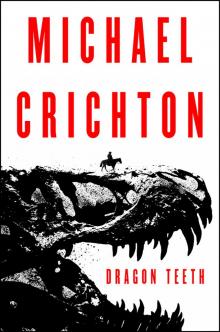 Dragon Teeth
Dragon Teeth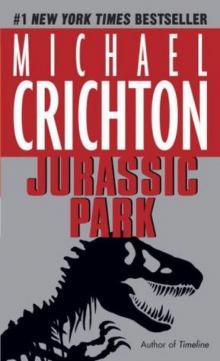 Jurassic Park
Jurassic Park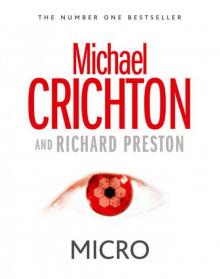 Micro
Micro The Great Train Robbery
The Great Train Robbery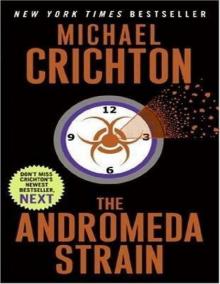 The Andromeda Strain
The Andromeda Strain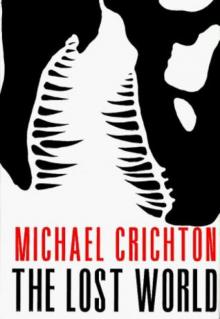 The Lost World
The Lost World Congo
Congo Travels
Travels Timeline
Timeline Sphere
Sphere Westworld
Westworld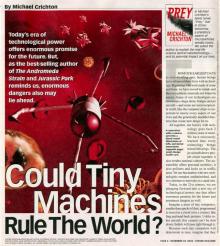 Prey
Prey State Of Fear
State Of Fear Next
Next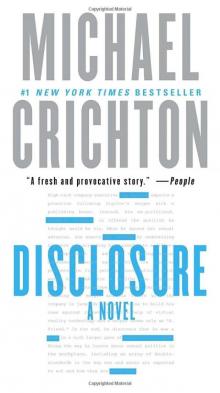 Disclosure
Disclosure Pirate Latitudes
Pirate Latitudes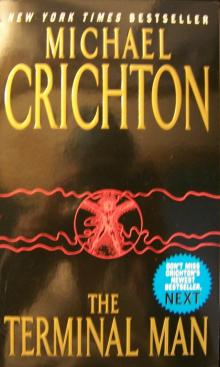 The Terminal Man
The Terminal Man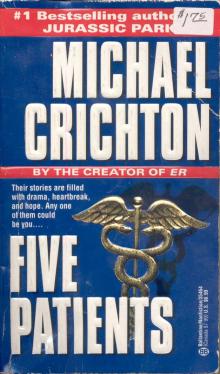 Five Patients
Five Patients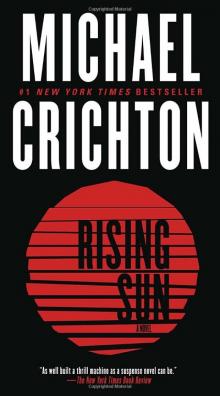 Rising Sun
Rising Sun Binary
Binary The Andromeda Evolution
The Andromeda Evolution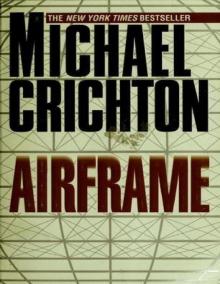 Airframe
Airframe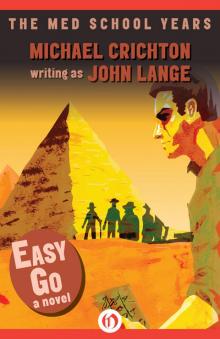 Easy Go
Easy Go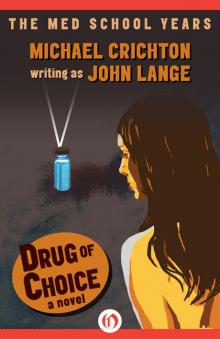 Drug of Choice
Drug of Choice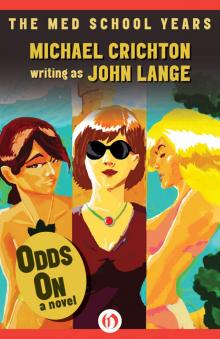 Odds On: A Novel
Odds On: A Novel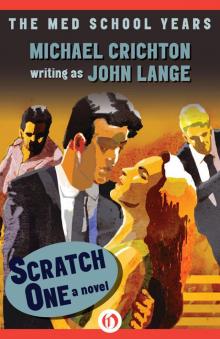 Scratch One
Scratch One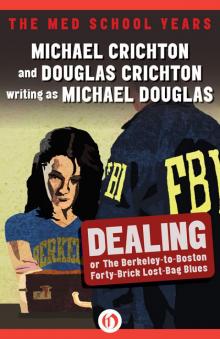 Dealing or The Berkeley-to-Boston Forty-Brick Lost-Bag Blues
Dealing or The Berkeley-to-Boston Forty-Brick Lost-Bag Blues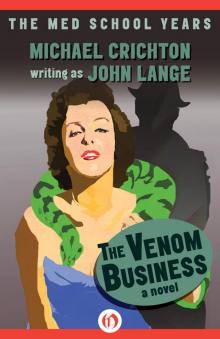 Venom Business
Venom Business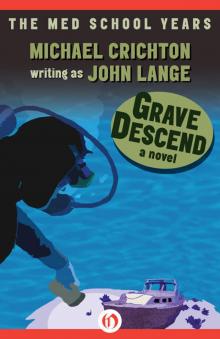 Grave Descend
Grave Descend Gold - Pirate Latitudes
Gold - Pirate Latitudes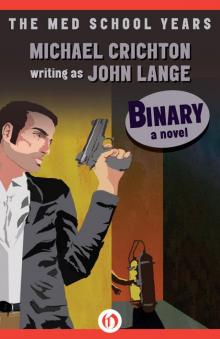 Binary: A Novel
Binary: A Novel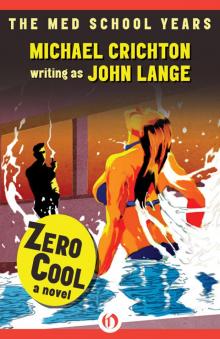 Zero Cool
Zero Cool Delos 1 - Westworld
Delos 1 - Westworld